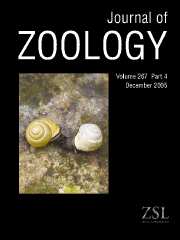Article contents
Altruistic sperm donation in a sperm-dependent parthenogenetic hermaphrodite is stabilized by reciprocal sperm exchange
Published online by Cambridge University Press: 17 February 2003
Abstract
Sperm-dependent parthenogenetic animals require sperm from an ‘altruistic’ mate in order to trigger embryogenesis, but without genetic contribution from the sperm donor. The stability of sperm donation is puzzling, particularly in populations that consist of sperm-dependent parthenogenetic hermaphrodites. Here, selection should favour total reduction of the male function, which would lead to population extinction. We investigated mating behaviour in a population of the sperm-dependent parthenogenetic, hermaphroditic flatworm Schmidtea polychroa. In this species, parthenogens possess a fully functional male reproductive system. We predicted that individuals should trade sperm and hence, only donate when receiving sperm from their partner. Results from 54 pairs indicate that conditional reciprocity is common, possibly even more so than in previously studied sexual conspecifics. In contrast to sexuals, however, parthenogens do not increase allocation to sperm with body size. Taken together, the data indicate that in order to receive sperm and ensure full maternal fertility, parthenogenetic S. polychroa must be able to produce and donate a minimum of self-sperm. As such, sperm trading contributes to the stability of apparently ‘altruistic’ sperm donation. This study is also the first convincing example of sperm trading in internally fertilizing hermaphrodites with a strong preference for the female role.
Keywords
- Type
- Research Article
- Information
- Copyright
- © 2003 The Zoological Society of London
- 9
- Cited by


